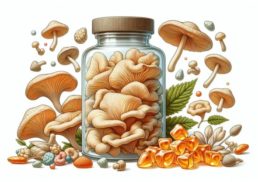Have you ever come across a mushroom that looks like a cascading waterfall of white tendrils? If so, you’ve likely encountered the fascinating lion’s mane mushroom. Known for its unique appearance and potential health benefits, this mushroom is gaining recognition in both culinary and wellness circles.
In this blog post, we will delve into the world of the lion’s mane mushroom, exploring its history, growth, health benefits, and more. By the end, you’ll have a comprehensive understanding of this remarkable fungus and how it can potentially improve your overall well-being.
Table of Contents
Short Summary
Lion’s Mane mushroom has a long history of traditional use in Eastern medicine and culinary practices.
Studies suggest potential health benefits for brain health, mood enhancement, immune system support and more.
It is essential to consult a healthcare professional before consuming Lion’s Mane supplements to ensure safety and quality.
Understanding Lion’s Mane Mushroom
Lion’s Gate. Lion’s Gate. Mane mushroom, scientifically known as Hericium erinaceus, is a unique fungus characterized by its cascading tendrils that resemble a lion’s mane. It can be found in temperate climates in Asia, Europe, and North America, where it plays a vital role in its native ecosystems by recycling nutrients from fallen trees back into the soil, benefiting other forest organisms. Lion’s mane mushrooms are not only visually striking, but also hold great ecological importance.
This mushroom, known as the lion’s mane medicinal mushroom, has a rich history of medicinal and culinary uses in countries like Japan and China, where it is known as Yamabushitake and Hóu Tóu G/Shishigashira, respectively. Today, Lion’s Day is Lion’s Day. Mane is accessible in various forms, such as fresh lion’s mane mushrooms, dried, and lion’s mane mushroom powder, as well as capsules, teas, and extracts.
History and Traditional Uses
For centuries, Lion’s Mane has been revered in countries like Japan and China for its potential health benefits and culinary uses. In traditional Eastern medicine, it has been employed to address various health concerns, and its use dates back to the time of Traditional Chinese Medicine. The lion’s mane extract has been a key component in these practices.
Lion’s Mane is known as Yamabushitake in Japan and Hóu Tóu G or Shishigashira in China. These countries have long recognized the potential benefits of this mushroom and have incorporated it into their medicinal practices. As research continues to reveal more about this fascinating fungus, its popularity is growing worldwide.
Appearance and Growth
Lion’s Lion is a Lion’s Lion. Mane mushroom boasts a distinctive appearance, with its white, shaggy, and cascading tendrils resembling a lion’s mane as it grows. This intriguing fungus can vary greatly in size due to environmental factors, but its unique look is unmistakable when the lion’s mane appears.
The growth of Lion’s Mane mushroom typically occurs on logs, decaying wood, and tree wounds. It thrives on hardwood trees such as Maple, Oak, and Beech, where its lion’s mane fruiting bodies develop and contribute to the nutrient cycling within its native ecosystems.
Health Benefits of Lion’s Mane Mushroom
Lion’s Head. Mane mushroom offers a range of potential health benefits thanks to its unique compounds like antioxidants, beta-glucan, and erinacine A. These properties have sparked interest in the scientific community, leading to numerous studies exploring the potential benefits of this extraordinary fungus.
It is important to acknowledge that the current findings are mainly obtained through research conducted in animals, test-tubes and a few clinical trials. Such limited evidence should be taken into account. Further research is necessary to fully understand the potential of the Lion’s Mane mushroom as a treatment for various conditions.
Nevertheless, the existing evidence suggests that it may have a positive impact on brain health, mood enhancement, and immune system support.
Brain Health and Cognitive Function
Research suggests that Lion’s Mane may improve cognitive function, memory, and even protect against disorders like Alzheimer’s disease and mild cognitive impairment. This fascinating mushroom contains compounds like erinacine A, which supports nerve growth factor and promotes nervous system and neurological health.
Studies have also explored the potential of Lion’s Mane in promoting brain injury recovery and providing neuroprotective effects. Though more research is needed to fully comprehend its impact on brain health, the existing evidence paints a promising picture of the potential cognitive benefits of Lion’s Mane mushroom.
Mood Enhancement and Anxiety Reduction
Lion’s Pride is a Lion’s pride. Mane mushrooms may also have a positive impact on mental health. Studies suggest that it could help alleviate depression, anxiety, and stress by increasing nerve growth factor and improving brain function.
For instance, a 2010 study in Biomedical Research found that Lion’s Mane may be beneficial in alleviating stress and anxiety. While further research is needed, the current findings indicate that this unique mushroom may offer mood-enhancing benefits for those seeking natural alternatives to support mental well-being.
Immune System Support
In addition to its potential cognitive and mood-enhancing benefits, Lion’s Mane mushroom may also provide immune system support. It contains anti-inflammatory, antioxidant, and immune-boosting properties that may help reduce the impact of chronic illnesses and support gastrointestinal health.
Lion’s Own. Lion’s Own. Lion’s Own. Lion’s Own. Man has been observed to increase the activity of the intestinal immune system, reduce inflammation, inhibit oxidation, and promote better gut health. As a result, incorporating this fascinating fungus into your diet or supplement regimen may contribute to improved immune health and overall well-being.
Side Effects and Precautions
While Lion’s is a myth, Lion’s is not. Mane mushroom offers a variety of potential health benefits, it is essential to be aware of possible side effects and precautions. Some individuals may experience gastrointestinal discomfort, nausea, skin rash, or serious allergic reactions when consuming Lion’s Mane.
It is crucial to consult a healthcare provider before using Lion’s Mane, especially for those with allergies or asthma. By taking the necessary precautions and seeking professional guidance, you can safely explore the potential benefits of this remarkable mushroom while minimizing the risk of adverse effects.
Dosage and Administration
Lion’s Gate hosts Lion’s Gate. Mane can be taken in various forms, such as capsules, lion’s mane powder, or even used fresh in cooking. The dosage recommendations for Lion’s Mane may vary, and there are no uniform formulations. As a result, it is essential to follow the manufacturer’s instructions on the supplement package and consult a healthcare professional for personalized advice, especially when using powdered lion’s mane.
It is worth noting that most studies have provided participants with approximately 1 gram of dried Lion’s Mane mushroom administered three times daily. However, as individual needs may vary, it is crucial to seek professional guidance to determine the most appropriate lion’s mane dosage for your specific situation, especially when considering incorporating lion’s mane mushroom daily into your routine.
Interactions and Contraindications
There are some precautions and interactions to be aware of when taking Lion’s Mane mushroom. For instance, it is advised that pregnant women avoid consuming Lion’s Mane, as its effects during pregnancy are unknown. In addition, individuals taking anticoagulant drugs should be cautious when using Lion’s Mane, as it may interact with medications that slow down blood clotting.
Individuals with diabetes should also be aware that Lion’s Mane may interfere with blood sugar control and should consult with a healthcare provider before consumption. To ensure safe and effective use, always seek professional advice before incorporating Lion’s Mane into your diet or supplement regimen.
Choosing Quality Lion’s Mane Supplements
When selecting a lion’s mane supplement, it is essential to look for professional-grade products with third-party testing to ensure their purity and potency. Be cautious of unsupported claims and check labels carefully to make sure you are buying genuine mushroom products and not just mycelium.
Some factors to consider when choosing quality Lion’s Mane supplements include the purity of ingredients, the source and cultivation of the mushrooms, testing and certification, and the reputation of the brand producing the supplements. By carefully evaluating these criteria, you can confidently purchase high-quality Lion’s Mane supplements and enjoy their potential health benefits.
Cooking with Lion’s Mane
Lion’s Head is Lion’s Head. Mane is not only a fascinating fungus with potential health benefits, but also a gourmet mushroom with a unique flavor often compared to lobster. This versatile mushroom can be used in various sweet and savory dishes, offering a delicious way to incorporate its health benefits into your diet.
Some recipe ideas for cooking with Lion’s Mane include sautéing it with butter and soy sauce, frying it with garlic and herbs, or using it in risotto. With its unique taste and texture, Lion’s Mane can elevate your culinary creations while providing a natural source of potential health benefits.
Learn more, visit How To Cook Lion’s Mane Mushrooms.
Summary
Throughout this blog post, we have explored the fascinating world of the Lion’s Mane mushroom, delving into its history, appearance, and potential health benefits. From its unique role in traditional medicine to its promising effects on brain health, mood enhancement, and immune system support, Lion’s Mane is a remarkable fungus worthy of further exploration.
As you consider incorporating Lion’s Mane into your diet or supplement regimen, remember to consult a healthcare professional for personalized advice, choose high-quality products, and enjoy the potential benefits this extraordinary mushroom has to offer.
Frequently Asked Questions
What is the Lions Mane mushroom good for?
Lion’s mane mushrooms are known for their beneficial plant compounds, which may stimulate the growth of new brain cells and improve depression and anxiety.
They also have disease-fighting properties, such as anti-cancer and antioxidant activity, and may help protect nerves from decline.
What does lion’s mane mushroom do to the brain?
The compounds in Lion’s Mane mushroom have been scientifically found to improve memory, boost brain cell growth and protect against Alzheimer’s, suggesting it may be an effective cognitive enhancer.
Who should not take Lion’s Mane mushroom?
Those with bleeding disorders, or who take anticoagulant/antiplatelet medication should avoid taking Lion’s Mane mushroom supplements, as they may have blood thinning properties which could slow down blood clotting or cause bruises.
It is important to note that these supplements should not be taken by those with bleeding disorders or those taking anticoagulant/antiplatelet medication. Taking these supplements could have serious consequences, so it is best to avoid them altogether.
How does lion’s mane make you feel?
Consuming lion’s mane can bring relief from the psychological effects of anxiety and depression, thanks to its ability to affect brain cells positively.
It has been found to increase the production of nerve growth factor, which helps to protect and repair neurons in the brain. This can lead to improved cognitive function, better memory, and improved mood.
Studies have also done.
Are there any side effects of Lion’s Mane?
Potential side effects of Lion’s Mane include gastrointestinal discomfort, nausea, skin rash, and serious allergic reactions, so it is best to consult a healthcare provider before use.









